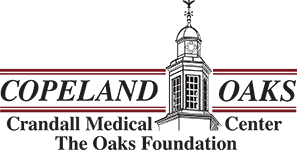How to Eat Healthy During Retirement
At Copeland Oaks we care about your health and wellbeing. That’s why our registered dieticians review our menu plans to assure they are nutritionally balanced.Vital nutrients can have a profound effect on overall health and longevity. In fact, there is growing evidence that diet plays an important role in heart health, mental health, bone health and decreasing the risk of certain cancers.
While healthy eating is important at any age, as a senior, a healthy, balanced diet is more important than ever — helping you to stay active and independent. Unfortunately, seniors are more susceptible to malnutrition. Recent research by the National Institute of Health reveals that as we age, not only does our metabolism slow down, our ability to utilize nutrients becomes less efficient. Yet, at the same time, our nutrient requirements actually increase. That means getting adequate nutrition can be a real challenge. No wonder the National Resource Center on Aging (NRCA) reports that about one in four seniors suffer from undernutrition.
Healthy Eating Patterns
Eating well supports mental acuteness, stabilizes your energy levels and boosts your immune system. A healthy diet for older adults focuses on whole, minimally-processed foods like on fresh fruit and vegetables, whole grains, lean meats and protein and dairy. It’s important to make healthy food choices a habit. Stick to three balanced meals a day, supplemented by healthy snacks.
Nutrients Needed
As we age, our metabolism changes and our bodies require fewer calories. Yet we need more of certain nutrients.
| Calcium and Vitamin D | Vitamin B12 | Dietary Fiber | Potassium |
|---|---|---|---|
| Why it matters: As we age, we experience bone loss. Calcium and vitamin D work together to promote bone health. | Why it matters: B12 helps form DNA, produce red blood cells and keep our nerve cells functioning. | Why it matters: Fiber helps eliminate toxins from your body. | Why it matters: Potassium lowers your risk of high blood pressure, osteoporosis, and kidney stones. |
| How much is recommended: 1,200 milligrams of calcium, 2000IU vitamin D | How much is recommended: 2.4 micrograms daily | How much is recommended: 21 grams for women, 30 grams for men | How much is recommended: 4,700 milligrams daily |
| Sources:Leafy greens and dairy offer calcium. And fatty fish and fortified foods are a good source of vitamin D. | Sources: meat, poultry, fish, eggs and dairy | Sources: fruits, vegetables, nuts, brown rice, whole grain cereal, breads and pasta | Sources: tomatoes, bananas, yogurt, citrus and lean meats |
Nutrition for Older Women
A variety and nutrient-dense, fiber-rich foods are an important part of a balanced diet for all seniors. 1 in 3 women over age 50 is at risk of a bone break due to osteoporosis so calcium and vitamin D are especially important. Women also need to make sure that they are eating enough protein. Aging naturally leads to a loss of muscle mass. Lean meats, poultry, fish, nuts and legumes are your best bet for healthy protein.
At Copeland Oaks, we support a healthy daily diet for senior women that includes:
- 7 servings of fruits and vegetables
- 3 servings of dairy
- 2 servings of meat and its alternatives
- 6 servings of grains
Nutrition for Older Men
The risk of heart failure is higher for men than it is for women. About 50% of people who develop heart failure will not survive more than 5 years. Increasing potassium and decreasing sodium intake helps to lower blood pressure. Magnesium also supports heart health. And eating healthy fats like nuts, avocados and extra-virgin olive oil are an important part of a daily diet for older men.
The nutritionists at Copeland Oaks support a healthy daily diet for senior men that includes:
- 7 servings of fruits and vegetables
- 3 servings of dairy
- 3 servings of meat and its alternatives
- 7 servings of grains
Popular Diets for Retirement
Nutrition plans like the Mediterranean and DASH (Dietary Approaches to Stop Hypertension) diets are supported by The American Heart Association and The American College of Cardiology science advisory.
DASH Diet (Dietary Approaches to Stop Hypertension)
A recent study by the Wake Forest School of Medicine reported that the DASH diet can reduce the risk of heart failure, for those under 75 years old, by approximately 50%. This diet is based on foods that are lower in sodium and rich in magnesium, potassium and calcium — nutrients that work to help lower blood pressure.
Mediterranean Diet
This plan focuses on fresh, whole foods like heart-healthy fruits and vegetables, moderate amounts of dairy, poultry and eggs. Research suggests that this diet can reduce the risk of cardiovascular conditions by nearly 30 percent.
Flexitarian Diet
This diet emphasizes plant-based foods, limits meat consumption and reduces processed foods and sugar. This diet notably reduces your risk of type 2 diabetes and heart disease.
Note that all three diet plans focus on whole, nutrient-dense, fiber-rich, plant-based food. We understand that eating well can help you stay well. That’s why the trusted dietary team at Copeland Oaks takes special care to plan our menus around the foods that support your health.
*Consult your doctor before engaging on a new diet or taking supplements.
You have to see it to appreciate it
We encourage you to visit, and we’ll be happy to treat you to lunch or dinner.
Please call 330-938-6126.
